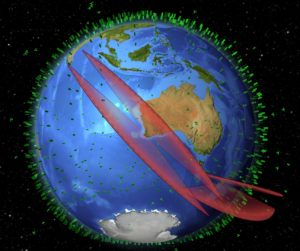
When the new radars are completed in 2022 it will expand LeoLabs’ total number of radar sites to six, and total number of space radars to ten.
The Californian-based company is a provider of low Earth orbit (LEO) mapping and Space Situational Awareness (SSA) services.
Pictured above is the space radar’s projected field of view.
southern hemisphere
“There is no location on the planet more strategic than Australia for monitoring the unprecedented growth of activity in low Earth orbit (LEO),” said Dan Ceperley, CEO and Co-Founder of LeoLabs. “On one hand, the West Australian Space Radar is perfectly positioned to expand LeoLabs capacity for tracking satellites and debris, improving the timeliness of all our spatial data and mapping services. On the other hand, this radar will join our global constellation of radars, improving our ability to monitor critical risks and events in space.”
“It further cements our lead as the only organization deploying extensive space coverage in the southern hemisphere. These capabilities constitute unique opportunities, in Australia and globally, for new products and services.”
Currently, the company’s catalogue tracks approximately 17,000 objects in LEO, but in the near future that will grow to 250,000 objects, said LeoLabs.
The West Australian Space Radar is expected to support more timely updates on critical events in LEO, including collisions, breakups, manoeuvres, new launches, and re-entries.
The company also expects the site to enable it to discover and track objects under 10 centimetres.
New Zealand
LeoLabs has previously been active in New Zealand, working on the Kiwi Space Radar (KSR), which was the third radar in its radar network.
The Phased Array Radar (above) is based on LeoLabs’ S-band technology and consists of multiple one-dimensional phased array radar systems.
LeoLabs was founded in 2016 as a venture-funded spinout of SRI International.
See also: LeoLabs tracks new financing to address LEO “Data Deficit”